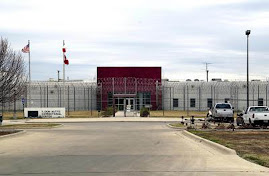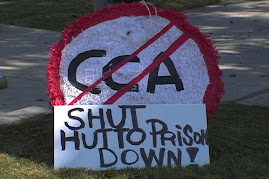
Posted: Wednesday, August 11, 2010 1:00 am
Tricia Rosetty | 1 comment
In a field outside of the T. Don Hutto detention facility, about 70 people gather in 100-degree weather. Sweat drips onto their poster board signs – signs that read “Dignity not detention” and “Immigrant civil human rights.” The peaceful gathering, one of more than two dozen over the last four years, commemorates significant change at the facility; namely, the one-year anniversary of changing policy to not detain families at the former prison, though women and children are still held.
According to organizer and president of Taylor’s chapter of the League of United Latin American Citizens (LULAC) José Orta, the vast majority of attendees at this weekend’s vigil were just people who care about the issue of immigrant detention, not those that know people in the facility. In fact, the group included people from as far away as San Antonio and the Rio Grande Valley. The display of solidarity at the first vigil to be held this year was important.
“The biggest problem in the community is the apathy that happens,” Orta said. “People become apathetic to this cause. They don’t see it as an issue that touches them, but then when it does they’re surprised that these measures have become so draconian.”
The T. Don Hutto facility has been run by the Corrections Corporation of America and faced two allegations of sexual assault by CCA guards in the last three years, casting uncertainty about the private company’s management. Grassroots organizations across the country have focused on reform at this and similar facilities.
“I thought it was really powerful for people to get together and express their feelings about detention reform. I think people have been pretty disappointed that there haven’t been more reforms,” said Bob Libal, Texas campaign coordinator for Grassroots Leadership, the umbrella organization for Texans United for Families. TUFF, a group fighting to bring attention to immigrant rights, emerged from the vigils at T. Don Hutto, said Orta. In addition to sharing their perspective on the importance of the issue, those in attendance marched with signs and chanted together for over an hour.
“The good thing about chanting and using a microphone is that it creates an echo. We were just hoping that the detainees could hear us,” said Orta, noting that a view from the entrance was blocked when the event began. While the detainees may not have been able to see their supporters, the importance of the issue to those present was clear.
“Being in the country illegally is a civil matter, not a criminal matter,” said Orta. He said that the model of using detention facilities is not the answer because it uses a criminal justice mindset to address a civil issue – a model he fears will be emulated at other sites. Orta suggested that house arrest or even ankle bracelets would be preferable to detention at a facility like T. Don Hutto.
“If you feel they don’t deserve to be here, send them back. Don’t keep them here for months as a form of punishment as if they’ve done something criminal,” said Orta, noting that many individuals who are in the country illegally are seeking amnesty from dangerous situations in their home country. “Just because these people are not citizens, doesn’t mean they don’t deserve to be heard.”
Orta suggested that a federally run program would provide accountability that privatization does not and simplify transparency.
“Our immigration system is broken and we need to fix it. Detention like this for long periods of time is not the answer,” said Orta. “There has to be some kind of reform because this detention is not giving us any sense of goodwill throughout the world, and that’s not the way our country should be seen.”

















